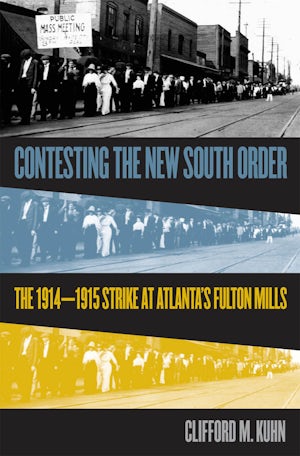Contesting the New South Order
The 1914-1915 Strike at Atlanta's Fulton Mills
By Clifford M. Kuhn
320 pp., 6.125 x 9.25, 29 illus., 1 table, 2 maps, notes, bibl., index
-
Paperback ISBN: 978-0-8078-4973-6
Published: September 2001 -
E-book EPUB ISBN: 978-0-8078-7530-8
Published: January 2003 -
E-book PDF ISBN: 979-8-8908-6922-7
Published: January 2003
Buy this Book
- Paperback $42.50
- E-Book $29.99
Drawing on an extraordinary collection of sources--including reports from labor spies and company informants, photographs, federal investigations, oral histories, and newly uncovered records from the old mill's vaults--Kuhn vividly depicts the strike and the community in which it occurred. He also chronicles the struggle for public opinion that ensued between management, workers, union leaders, and other interested parties. Finally, Kuhn reflects on the legacy of the strike in southern history, exploring its complex ties to the evolving New South.
About the Author
Clifford M. Kuhn is associate professor of history at Georgia State University and director of the Georgia Government Documentation Project. He is principal author of Living Atlanta: An Oral History of the City, 1914-1948.
For more information about Clifford M. Kuhn, visit
the
Author
Page.
Reviews
"Kuhn's book has considerable interest for southern labor history. . . . His understanding of women's roles in the strike is welcome. . . . An enjoyable read."--Labor History
"Contesting the New South Order should assure the Fulton Bag strike's rightful place alongside the contemporaneous upheavals in Lawrence, Ludlow, and the Lower East Side as a pivotal moment in the nation's Progressive Era industrial history."--Journal of American History
"Kuhn's narrative . . . is enhanced by vivid descriptions of key players and the actions of ordinary workers responding to an extraordinary situation. . . . An important book that advances our understanding of mill workers and owners in the early twentieth century."--Journal of Southern History
"In Contesting the New South Order, Clifford M. Kuhn deftly saunters through the early twentieth-century dialectic of continuity and change in a transitional South. Through a thorough use of primary sources connected with the strike, and with the changing social climate of the region, he fashions a persuasive argument regarding both the unique qualities of the strike, and its regional, even national, significance. . . . The vivid descriptions of the behaviors, attitudes and environment of all the parties involved-workers, owners, management, politicians, union representatives-makes for fascinating reading. . . . Kuhn makes a unique and worthy contribution to the scholarship on traditionalism versus modernism in southern history, and on gender, race, and labor relations in the twentieth-century South."--Georgia Historical Quarterly
"A richly detailed and smartly analytical work. . . . It stands on its own as one of the most thorough chronicles of a lengthy strike in American history."--Business History Review
"Kuhn offers a detailed look at the issues that led to the strike and the personalities on both sides of the dispute. In addition, he does a good job of putting the dispute in a broader social context. . . . It is to Kuhn's credit that he leaves no aspect of the strike unexplored."--Business History




